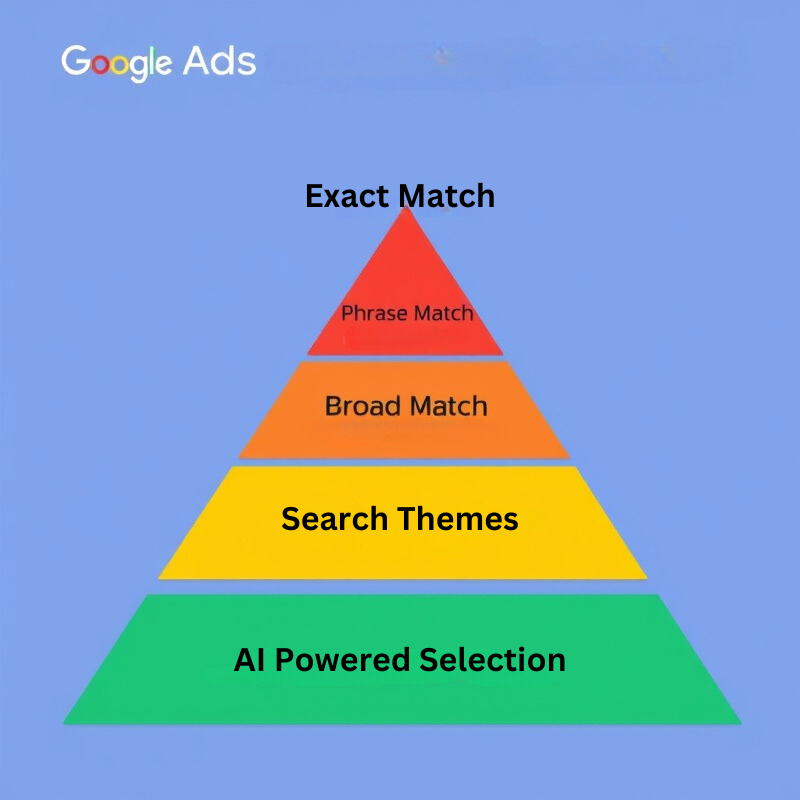Hey there, digital marketers
and business owners! Ever scratched your head wondering why your Google Ads are
showing up for seemingly random searches? Or maybe you've noticed your
top-performing search campaign suddenly went quiet after launching Performance
Max? Well, buckle up because we're about to dive into the wild world of Google
Ads keyword prioritization!

Key Takeaways:
- Keyword prioritization determines which of your ads Google shows for a user's search
- Exact match keywords get top priority, but only when they're identical to the search query
- Phrase match, broad match, and Performance Max search themes share second place
- Ad rank still plays a crucial role in determining which ad enters the auction
- AI-powered prioritization considers various factors to choose the most relevant ad
Now, let's break this down in a way that even your grandma could understand (no offense, Nana, you're pretty tech-savvy!).
What's the Deal with Keyword Prioritization?
Imagine you're at a party, and someone asks for a drink. You've got a variety of beverages to offer, but you can only hand them one. How do you choose? That's essentially what Google does with your ads every time someone searches for something related to your business.
There are several ways your ads can match to a user's search:
- Keywords in search campaigns (broad, phrase, or exact match)
- Search themes in Performance Max campaigns
- Dynamic ad targets in search campaigns
- AI-matching for Performance Max campaigns without search themes
For simplicity's sake, we'll call all of these "keywords" from here on out. (Don't worry, Google, we know the difference!)
Keyword Matching vs. Keyword Prioritization: What's the Difference?
Okay, pop quiz time! Just kidding, but here's a quick explanation:
- Keyword matching is like getting invited to the party. It determines whether your ad is eligible to show up for a search.
- Keyword prioritization is like being chosen to give a toast. It decides which of your eligible ads actually gets to show up.
Let's say someone searches for "led lightbulbs." Your account might have multiple keywords that could match:
- "lightbulb" in your general campaign
- [led lightbulbs on sale] in your discount campaign
- Dynamic ad targets for LED lightbulb product pages
So, how does Google decide which ad to show? That's where keyword prioritization comes in, using a fancy AI-powered system to choose the best candidate for the auction.
5 Things You Need to Know About Google Ads Keyword Prioritization
- Exact Match Keywords Are the VIPs: If you have an exact match keyword that's identical to the user's search, it gets the red carpet treatment. But here's the catch: it needs to be exactly the same, not just similar.
- When Exact Really Means Exact
· Synonyms (like "Google Ads" vs. "AdWords"): Not identical, no VIP treatment
· Misspellings (like "Google Ads" vs. "Gogle Ads"): Considered identical, gets the VIP pass
· Plurals (like "Google Ads tool" vs. "Google Ads tools"): Not identical, no special treatment
- Phrase Match, Broad Match, and Search Themes: The Runner-Ups If there's no exact match keyword, Google looks for phrase match keywords, broad match keywords, or Performance Max search themes that are identical to the search.
- Ad Rank: Still a Big Deal When multiple keywords are at the same priority level, the one with the highest ad rank gets to shine. Ad rank is basically a combination of your bids and Quality Score. The higher, the better!
- AI-Powered Prioritization: The New Kid on the Block - When a search doesn't exactly match any of your keywords (which is pretty common), AI steps in. It looks at all your targeting options and chooses the most relevant ones based on the search meaning, your keywords, and your landing pages.
See How Digital Marketing All Can Drive More Traffic to Your Website
- Brand Voice Strategy – Let our team help you create your brand voice to attract your ideal customer.
- Keyword Weak Spot Report – Let our team show you where you can gain additional traffic that you are missing.
- SEO - unlock more SEO traffic. See real results.
- Content Marketing - our team creates epic content that will get shared, get links, and attract traffic.
- Paid Media - effective paid strategies with clear ROI.
What Does This Mean for Small Business Advertisers?
- You're Not as In Control as You Think Sorry to break it to you, but you can't micromanage every search your ads show up for. Embracing automation and providing good data for Google's AI is likely to yield better results than trying to control everything manually.
- Dynamic Search Ads Are Getting the Short End of the Stick It looks like Google might be phasing out dynamic ad groups in favor of Performance Max. If you're a fan of Dynamic Search Ads, you might want to start exploring other options, like broad-match keywords with responsive search ads.
- Ad Rank Is Still King At the end of the day, your bids and Quality Score are still super important. Focus on improving these to boost your chances of winning auctions, no matter what queries you match with.
FAQs
Q: How can I improve my keyword prioritization?
A: Focus on creating high-quality, relevant ads and landing pages. Use a mix of match types, but don't rely too heavily on exact match. Keep an eye on your Quality Score and adjust your bids as needed.
Q: Does keyword prioritization affect my ad costs?
A: Indirectly, yes. Better prioritization can lead to higher Quality Scores and better ad positions, which can potentially lower your costs per click.
Q: How often does Google update its keyword prioritization algorithm?
A: Google is constantly tweaking its algorithms. While major changes are usually announced, small updates happen frequently. Stay informed by following Google Ads' official blog and trusted industry news sources.
Wrapping It Up
Understanding Google Ads keyword prioritization is like learning to play chess - it takes time and practice to master. But armed with this knowledge, you're well on your way to becoming a Google Ads grandmaster!
Remember, the key is to work with Google's AI, not against it. Focus on creating high-quality, relevant ads and landing pages, and use a mix of targeting options to cast a wide net. Keep an eye on your performance metrics and be ready to adapt your strategy as needed.
By the way, did you know that businesses using Google Ads typically see a return of $2 for every $1 spent? That's a pretty sweet deal if you ask me! (Source: Google Economic Impact Report)
So, are you ready to take your Google Ads game to the next level? Remember, Digital Marketing All is here to help you navigate the ever-changing landscape of digital advertising. Whether you need help with your brand voice, keyword strategy, or overall digital marketing plan, we've got your back!
I hope you enjoy reading this blog post. If you want my team to just do your marketing for you, click here.
 Add Row
Add Row  Add
Add 







